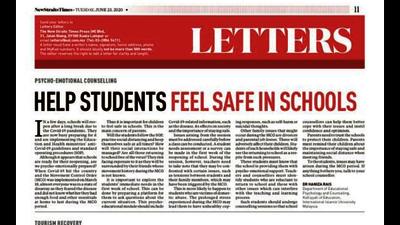Rais, Haniza (2020) Help students feel safe in schools. New Straits Times, 23 June 2020.
![[img]](http://irep.iium.edu.my/88750/2.hassmallThumbnailVersion/help%20student%20feel%20safe%20june%2021%2C%202020.jpeg)
|
PDF
Download (87kB) | Preview |
|
|
PDF
- Published Version
Download (9MB) | Preview |
Abstract
One of the biggest misconceptions we have as adults is that we think children have no feelings. Just because they can’t say it in words, does not mean they do not experience feelings. Kids are miniature adults who do encounter both positive and negative feelings in their daily lives. Children in general, experience happiness and sadness, fear and anger, worry and anxiety, and other. However, they usually lack the ability to describe these feelings, and so, they are not able to properly express themselves verbally. Some of these negative feelings are then translated in their misbehaviors like throwing tantrums. Some chose to withdraw or isolate themselves from others. Younger children have nightmares and sleepless nights. Certain unpleasant experiences can be assumed from the children’s physiological symptoms like frequent night urinating, vomiting or diarrhea that are not due to medical reasons. Their anxiety and worries are expressed in different ways. Coming to school after Covid-19 can be a challenge to some kids. COVID-19 has been viewed as a ‘huge mean ugly monster’ by the youngs, that has ruined normal life for all. Everyone has been affected. Parents and siblings are taking all precautions very seriously and the children are expected to follow. Observing adults, children may have developed scary thoughts during the MCO. To be in school, leaving home for the first time after a few months of ‘quarantine’ can be a totally new experience. The new normal will be another totally new phase to the pre-schoolers, different from the experience they had earlier this year. The first day back to school, the young will start the day early. The process of detachment from the comfort of a home to that of a school setting, full of rules and regulations. Their friends may be seen as new faces of strangers. Asking them directly may not work. As mentioned earlier, they do not have the vocabulary for that. Both parents and teachers need to explore those feelings and experiences. Play therapy techniques may help to express those internal issues of mixed feelings. The worries, anxiety and fear in them that can interfere in their process to adjust the transition from home to schools, leaving mom and family and accepting teachers and friends. Some of the tools can be very casual and fun. To begin with, children can be tuned in to the school mood by doing simple dance and movement with lively songs to sing. This activity helps them set the mood to be in a classroom setting with a teacher and friends.
| Item Type: | Article (Electronic Media) |
|---|---|
| Additional Information: | 1798/88750 |
| Uncontrolled Keywords: | Psycho-emotional counseling |
| Subjects: | L Education > L Education (General) |
| Kulliyyahs/Centres/Divisions/Institutes (Can select more than one option. Press CONTROL button): | Kulliyyah of Education Kulliyyah of Education > Department of Educational Psychology & Counseling |
| Depositing User: | AP Dr Haniza Rais |
| Date Deposited: | 10 Mar 2021 15:19 |
| Last Modified: | 31 Mar 2021 11:55 |
| URI: | http://irep.iium.edu.my/id/eprint/88750 |
Actions (login required)
 |
View Item |


 Download Statistics
Download Statistics Download Statistics
Download Statistics